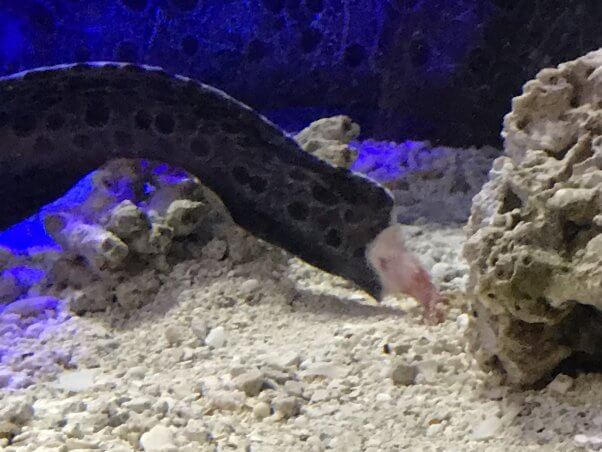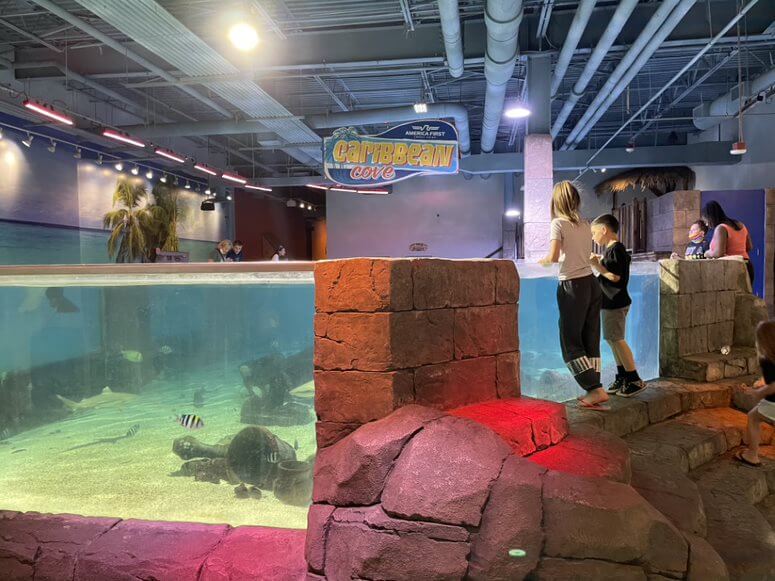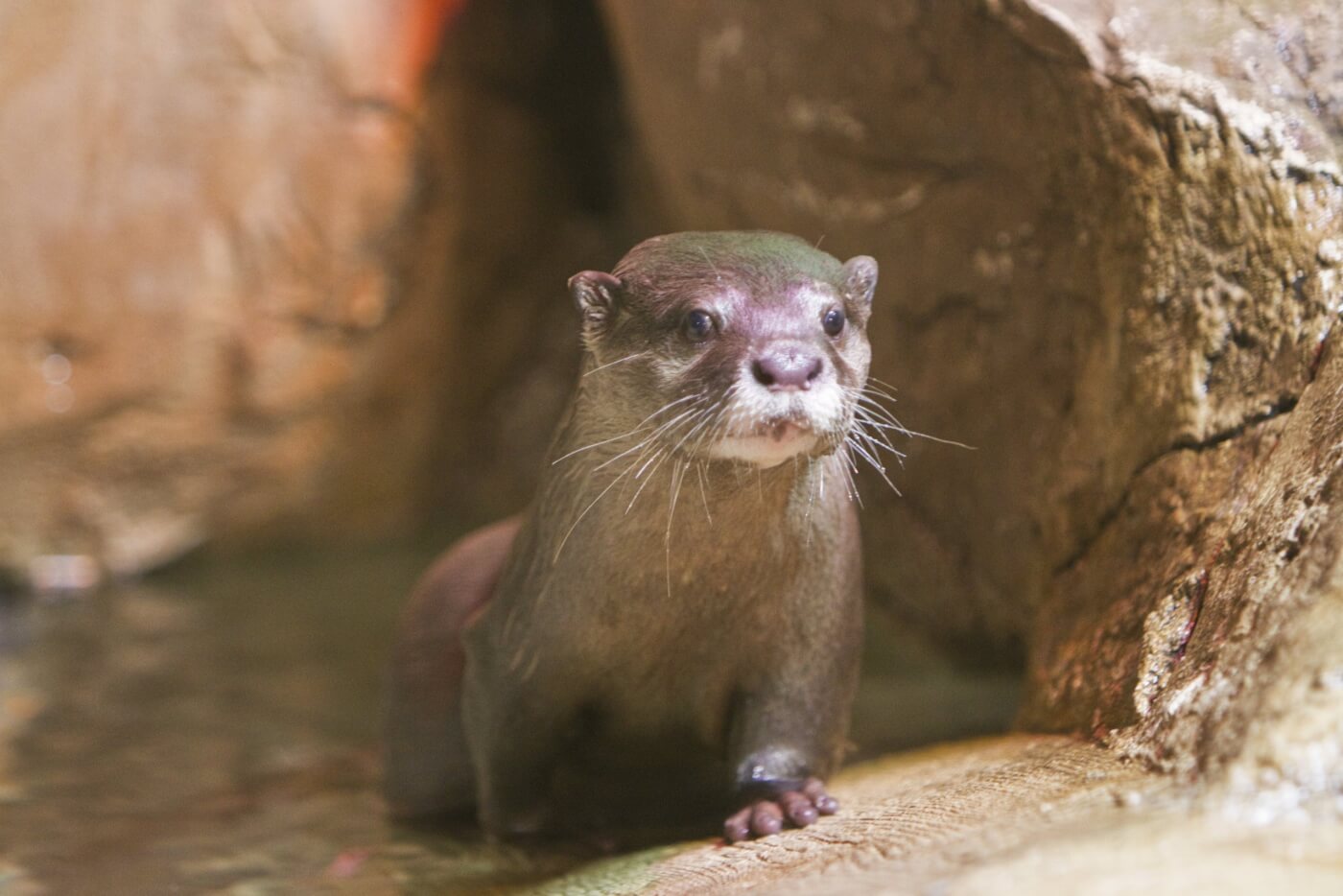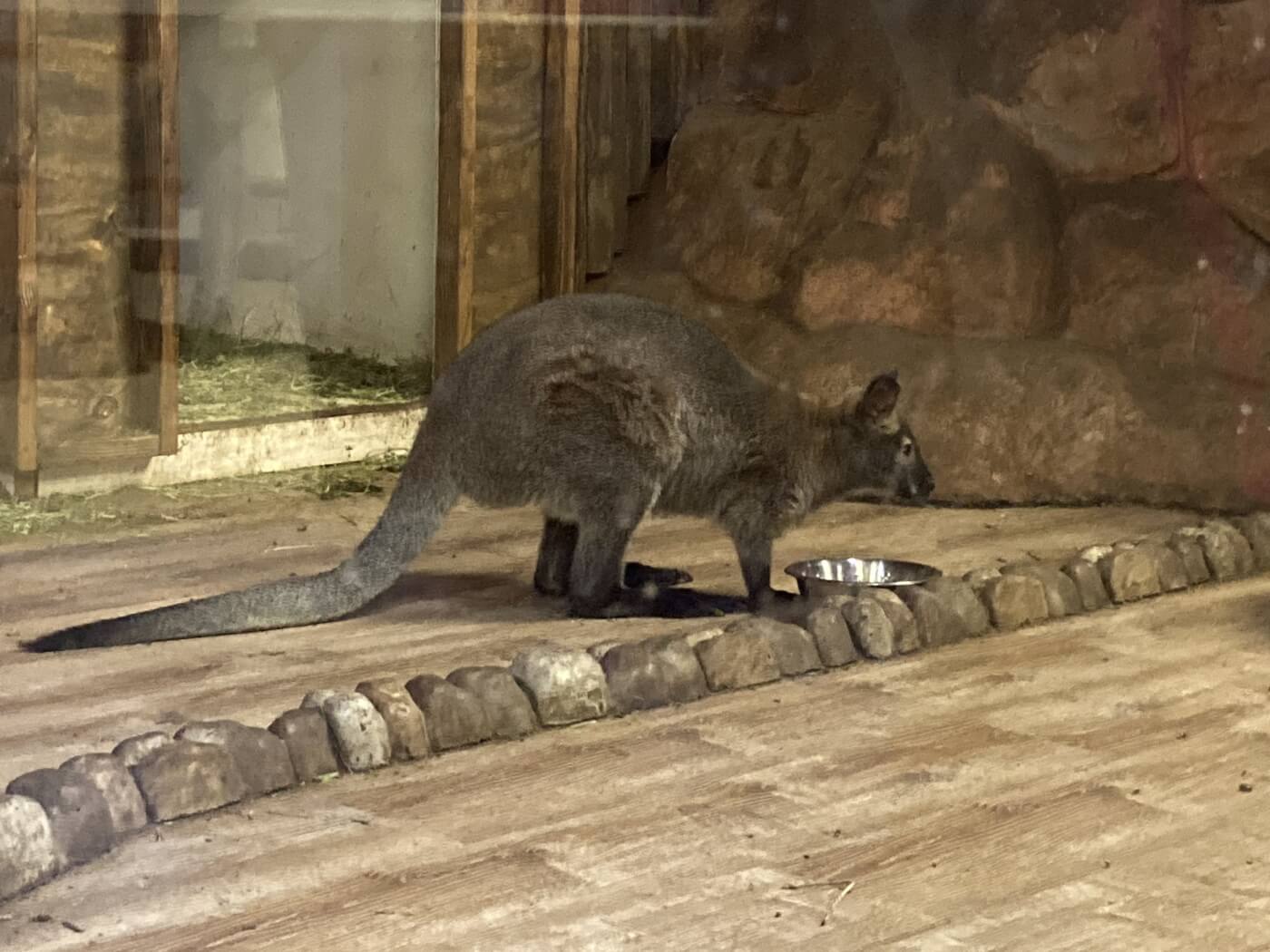Don’t Roll the Dice: All Animals at SeaQuest Las Vegas Are Unlucky
SeaQuest Las Vegas is a shady roadside aquarium with a troubling history of injuries to both animals at the facility and human visitors, including children. In previous years, a mother reported on Yelp that a coatimundi there scratched her son’s face and eye and that an ambulance was called to take the boy to the hospital, a kinkajou bit an employee, and a small-clawed otter bit a staffer during a presentation. Other animals at the facility have drowned to death or have been left to suffer with exposed bone. PETA urges families to avoid the facility and the U.S. Department of Agriculture (USDA) to terminate its license.
Keep reading for more reasons why SeaQuest Las Vegas is bad for animals and unsafe for visitors:
In June 2023, following a tip from PETA, the USDA cited SeaQuest Las Vegas over an incident in which a wallaby lunged at a child’s face.
Records indicate that the wallaby’s paw made contact with the child’s face during a feeding encounter and that the incident went unreported by SeaQuest staff. The feds noted that “there was not sufficient distance or a barrier between the animal and the child to prevent potential injury.”
This incident underscores just how dangerous it is for SeaQuest to allow contact between its human customers and the animals it exploits.
On December 8, 2022, the USDA fined SeaQuest $4,500 for multiple alleged violations of the federal Animal Welfare Act.
The fine was for incidents at three SeaQuest locations, including one in which an otter was injured when a door fell on his foot at SeaQuest’s Las Vegas facility. The otter, Dale, sustained the dislocation of one toe, a fracture to another toe, and a laceration of his footpad.
Other animals at the same facility have bitten employees, drowned to death, and been left to suffer with exposed bone.
On September 24, 2021, PETA alerted Clark County Animal Control to a wolf eel named Saturn, whose tail had been partially eaten, leaving painfully exposed tailbone.
Despite the severity of the injury and a sign stating that Saturn was under veterinary care, records show that SeaQuest didn’t have a veterinarian look at the injury until six days after we had alerted authorities. In addition, Saturn had apparently not been eating well since May and, according to the veterinarian, had been suffering from “complete anorexia” for more than six weeks. Saturn’s months of misery ended on November 2, when the animal was euthanized—more than a month after PETA first alerted animal control to the tail injury. According to records, Saturn’s tail injury had been caused by a sea anemone in the tank who had “damaged/eaten” 1.5 inches of the tip of the tail, leaving part of the tailbone exposed.

In July 2021, the U.S. Department of Agriculture (USDA) cited SeaQuest Las Vegas after an inspector saw an unattended visitor reach over an enclosure fence and pet a capybara.
Allowing unattended public contact with wild animals is dangerous and a violation of the federal Animal Welfare Act. Given that SeaQuest’s business model fosters this type of reckless public interaction, it’s no surprise that people are being injured by stressed animals who don’t want to be touched.

In July 2020, a 1-year-old sloth named Flash died at SeaQuest Las Vegas.
He was thin when he died and had a history of weakness, twitching, and lack of appetite. PETA asked the USDA to investigate the circumstances that had led to his death, including whether SeaQuest had the knowledge and experience to care for this species adequately.
In April 2021, another sloth named Flash died under similar circumstances at SeaQuest Las Vegas.
The second Flash had only been at SeaQuest Las Vegas for five months before he died. The necropsy documented that he had been found “minimally responsive on the floor” and had “developed twitching behavior” and lack of appetite—similar symptoms to those displayed by the first Flash, who died just seven months after his arrival at SeaQuest.
When one sloth died at SeaQuest, the company simply got another, gave him the same name, and let him suffer the same fate.
In August 2020, the USDA cited SeaQuest Las Vegas for failing to have acquisition records and appropriate identification for three Bengal cats.
A February 2019 multipart investigative report exposed several issues with SeaQuest Las Vegas, as described by five former employees who alleged that the facility is dangerous for the public, staff, and animals.
One former employee reported that children had stomped on birds in the interactive aviary, killing them, and that the dead animals had been thrown into the garbage.
Another former employee reported similar incidents with small turtles, some of whom, he claimed, had been crushed by children. “I think they started with 12. By the time I left they had three,” he said.
A former employee also reported that a large octopus had been “cooked alive” after the tank’s water temperature changed overnight.
In addition, according to reports, the former employees provided videos and photos of “a sump room wall covered in black mold, a dead turtle they say was left to rot for days in the koi tank, and a bug-infested drain in the aviary where they say birds drank and bathed before interacting with guests.”
In February 2019, after a litter of Asian small-clawed otters was born, Clark County Animal Control fined SeaQuest Las Vegas $2,000 and issued it a citation for having unpermitted animals.
In the administrative decision upholding the citation and fine, the hearing officer scolded SeaQuest for attempting to profit from its permit violation by issuing a news release advertising an event to exhibit the unpermitted baby otters. The hearing officer also questioned “the knowledge and experience” of SeaQuest, since it didn’t know that an otter named Hazelnut was pregnant until about a week before she gave birth.
In May 2019, a 4-month-old otter named Dale bit a SeaQuest employee while being bathed, and in September 2019, an 8-month-old otter named Chip bit an employee on the wrist.

In April 2019, a news report detailed allegations from a former employee that SeaQuest Las Vegas withheld food from animals to force them to interact with guests, who pay to feed them.
In October 2018, SeaQuest was cited and fined after a capybara named Wesley escaped while being transported to a veterinary office.
He was in a dog crate in the back of an open-bed pickup truck when he escaped and was reportedly recaptured in a Target parking lot. He had several injuries and was bleeding from his face and mouth. The veterinarian’s report found that Wesley had multiple wounds, was limping, and had broken two teeth at the gum line.
In August 2018, a female Asian small-clawed otter drowned at SeaQuest Las Vegas.
According to the necropsy report, she was found dead at the bottom of her enclosure one morning. She had drowned after her arm was sucked into a pool filtration system.
In May 2018, a female Asian small-clawed otter died at SeaQuest Las Vegas.
The necropsy report stated that the “stress of shipping to Vegas, introduction to a new environment and caging during construction may have caused fatal cardiac consequences.”
In April 2018, Clark County Animal Control warned SeaQuest that it was illegally housing otters and a coatimundi without the required permits.
In 2017, a former employee came forward with reports of apparent animal neglect at SeaQuest Las Vegas, saying that he saw hundreds of animals die.
You can join PETA’s efforts in behalf of animals suffering at SeaQuest Las Vegas and other SeaQuest aquariums across the country.
The best thing that you can do to help is to refuse to buy a ticket. Then, encourage your friends, family members, and social media followers to do the same.


